National Unity Among Threats of Extremism or Seven Short Notes from the Seven Days of the Warsaw Conference
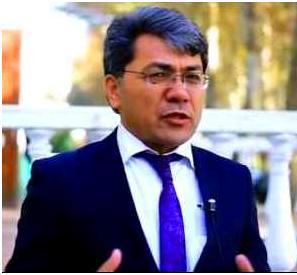
DUSHANBE, 23.09.2019 (NIAT Khovar) – As previously reported, an annual OSCE human rights conference is being held in Warsaw. Member of the official delegation of the government of Tajikistan Abdullo Rahnamo noted seven important things that we will now relate to our readers.
First. The Warsaw conference on human rightsis being attended by official delegations of 57 OSCE member states and about 40 regional and international organizations, which speaks to the scale and level of the conference. If we add that representatives from public and non-governmental organizations, oppositionists and like-minded people are also present, the scale of the conference will increase even more.
However, only two minutes is allocated for each state or speaker, which is not enough to discuss human rights issues. What can be said in two minutes? Since everyone knows about it, using the allotted time, they defend or criticize in two words and immediately give the floor to others. In my opinion, this conference is not scientific or effective, and outwardly its goal is not to discuss human rights issues. Likelier, this is a political arena that allows its directors consciously and demonstratively defend a particular state or group, reflecting their positions and interests. No decisions are made, and nothing is achieved during these conferences. In view of this, it is likely that in the future this conference will not be perceived as serious.
Second. From the very beginning, Tajikistan’s official delegation reacted to this conference in a businesslike manner. The delegation of the OSCE member state haspresented itself as a state delegation, at the proper state level. The delegation is composed of competent, qualified, responsibleindividuals and experts on the issues on the agenda of the conference.
Contrary to the sensational expectations of news agencies, the participation of the government delegation is not a response to the presence of the opposition, nor is their presence geared toward answering their questions. They have not been recommended to engage in disputes or debates and so are inattentive to their presence or absence. Thus farthe delegation has discussed state policy, the reality of society, and corrected the erroneous ideas and stereotypes of those present. In the first week, the delegation has completed its mission.
But the official delegation members did not have a sour look on their faces. Personally, due to ournational culture and good manners, I greeted every compatriot that I met in the hall withrespect, i.e.both the known opposition members and the many unfamiliar young people.And when the opportunity presents itself, as a citizen and as a teacher I wholeheartedly urge these young people to protect the image of the nation and the stability of the country. Some were bewildered by my greetings and show of respect, which caused them to involuntarily clench their fists, but I was not embarrassed, and talked about the homeland and conveyed greetings from my people. I was and am proud that I came from the Motherland and feel that I had a moral right to do so.
When coming face-to-face with an opposition member, I try to follow example of President Emomali Rahmon’s political culture and good manners, which Ihad observed during the signing of the peace agreement. While the fighting continued in Rasht and Tavildar, with a smile and an open soul President Emomali Rahmon called on the opposition to return to the axis of national values and national interests. «Domullah [S. A. Nuri], perhaps it’s enough already.Return to Tajikistan, to improve the homeland….»said President Emomali Rahmon.
Third. Opposition figures are also present at this conference. Perhaps more than 60 individuals registered themselves as such in this “ungated city.” Only»Group 24″ consisted of 21 people, according to their data. Members of the Islamic Renaissance Party (IRP) also sat in the corridor in a semicircle. There are migrants, youth, members of the alliance, “reformers,”independents and many others. I had no idea that among the people and groups that we call the “opposition” there are so many contradictions and divisions.
Many of them do not greet each other, at the first opportunity spewing dirty cursesat each other and calling each other by nicknames that cannot be written here. Everyone considers themselves right and others wrong. They consider themselvesto beagents, representatives of various projects of countries or special services.
For example, even before Izzat Amon’s arrival from Moscow, the oppositionreceived the news with hostility, perceiving him as their new rival in the narrow scene of the opposition and put forward dozens of versions about his new projects and initiatives.
Even members from the same group blame each other when they find the opportunity. The situation is depressing. It is embarrassing that the old-time opposition leader, the leader of the Watandor political movement Dodojon Atovulloev, filled his page with words of bitterness and sarcasm.
“For the first time, I am ashamed that I am an oppositionist,” he stated.
Fourth. The behavior of opposition group representatives is not appropriate either. These groups which included those between 20 and 25 years old, do not have the appearance or the personality of oppositionists. They could neither express their thoughts nor defend their position. In this situation, they played two roles: first, in the corridors and at meetings, to show disrespect to those who came from Tajikistan, insult them, make fun of them; second, to get the right to speak and read the text, consisting entirely of errors, lies and slander. This scene is shameful and embarrassing. Another skill that these young men have been taughtis to clandestinely record the Tajiks in attendance. They have been secretly recordingthe Tajik delegation, -from how they are sitting, walking, eating, even how they go toward the toilet. I asked several of them: “Where have such young men as yourselves learned the art of surveillance? Is this really your “opposition” level? And you claiming reform and power!”
In general, several spies and hooligans are introduced at an OSCE conference to represent the opposition. But when there are no more words, programs, or speeches, they usetricks, spies, intrigues, and insults.
Of course, it soon became clear that the recordings were being made in order to ridicule the representatives of Tajikistan and exert psychological pressure on them. On the second day of the conference, CATV showed a ten-minute shot of Domullah Abdurahim Karimov eating, which was taken with a hidden camera. It was a normal meal. But this behavior of 20 to 25-year-old young people towards a 70-year-old man does not indicate anything but bad manners and disrespect. The 67-year-old civil society representative Kamoljon Samiyev was surprised to note that this group of young people cynically ridiculed him, especially his Tajik skullcapevery time he passed them. After observing such scenes, I felt even more Muslim than these new Islamists. I have arrived at a conclusion that we do not actually have an opposition. These individuals have not yet grown enough to reach the level of the responsible concept of “opposition.”
Fifth. Another phenomenon that I witnessed was the “National Alliance of Tajikistan” (NAT). As for this organization, I said earlier that it does not have an “alliance” nor is it “national.”. However, contrary to the propaganda of news agencies, the range of speeches of this organization and its structural units once again showed that it does not present anything serious.
Upon hearing their unfounded and listless speechesof those like Ravshani Temuriyon, Temuri Varki and Alim Sherzamonov, who have been hired outside the religious party, the “alliance” representatives blushed from embarrassment.
Perhaps the speech of the head of NAT M. Kabiri, who “pulled the strings” behind the scenes, would be more useful for them, because those who lack ideas and thoughts resemble beagle dogs, which not wanting to run,areyet forcibly dragged for hunting.
As a participant in the conference, I can say that the performances of several young people from Group of 24 were much livelier than those of the Alliance. While «alliance» representatives mumbled something, were apathetic and depressed, these young people had exuded energy and spirit. Therefore, when I came to face them, I told them to return and use their energy and spirit toward creative endeavors in Tajikistan.
Conclusion. The first week of the conference shows that this artificial platform — the “National Alliance of Tajikistan,” which was used as a national and European disguise for the religious party, is no good and offers nothing new. This organization, which claims to be the leader of the united opposition and to encompass various groups opposing the state, actually consists of several former members of the religious party and several other people.It has no potential, no program, and no prospects. Oppositionists themselves do not even recognize it, because the conference showed that oppositionists like Dodojon Atovulloev, Hokimshoh Muhabbatov, Hafiz Boboyorov, Group-24, Izzat Amon, the migrant movement and others, stand against it.
Sixth. The presence of Tajik civil society at the Warsaw conference was a new and very instructive phenomenon for me. Those in attendance include several journalists, public activists, representatives of non-governmental organizations, ordinary citizens. On the first day, I saw a Tajik man in a traditional skullcap and a woman in an adras dress (a kind of Tajik dress) with a scarf on her head. I thought that they were representatives of the Renaissance Party. But when they spoke of defending the homeland, nation, peace and stability, I was involuntarily embraced by a sense of pride…
The participation of the Tajik State University teacher from Bokhta, Dilorom Makhkamova, who dressed in a traditional manner was akin to representing the national flag of Tajikistan in the international arena, and all Tajik women and mothers. This woman, who during the civil war had lost her father, brothers and children, told everyone what a civil war is and what the consequences of extremist thinking may be for Tajikistan. This woman did not talk about politics and ideology, she only spoke of the tragedy of her family, who were killed in 1992 by the hands of extremists. But her simple story evoked a surprising reaction in the participants of the meeting.
The presence of civil society representatives demonstrates that, though they are part of the government, and are involved in a non-governmental organization, the concepts of homeland, peace and stability are sacred to all Tajiks, -they all seek to protect these values. It was an important message that was conveyed to both the people and the international community.
Seventh. As part of the conference, last night, Tajik students studying in Poland held an analytical forum titled “Tajikistan: National Solidarity Along with the Threat of Extremism,” which was perhaps more important than the Warsaw conference itself. The forum brought together a wide circle of thinkers and representatives of various groups who spoke about national values. Indeed, the state, the government, and law enforcement agencies are fighting against extremism as part of their official duties, but the apogee of the conference was that the Tajik intelligentsia, thinkers and scientists, regardless of their political and cultural platform, voted against a common threat, that is, extremist and destructive thinking .
The Tajik scientist living in Russia, the head of the National Movement of Tajikistan, Hokimsho Muhabbatov while sharing his rich experience, emphasized that religious extremism and youth involvement in extremist and radical groups is now threatening not only Tajikistan, but through foreign migration and also in educational environments threatens every young person and citizen…
Here it became clear to us that, irrespective of political differences between free-thinkers and national figures, creative concepts such as “national statehood,” “national values,” “secular state systems,” “free and independent Tajikistan,” “calm and prosperous homeland,”- are values in relation to which all — the intelligentsia and representatives of different layers have a common opinion and a common position. We may have different opinions and visions, but when it comes to our homeland, the fundamental values of the state, the threat of extremism, we must all consolidate in defense of these values. This message of Tajiks living in Poland, emphasizes the need for national solidarity along with the war against extremism, and should reach every Tajik cultural figure and intelligentsia, awaken them, rescue indifference from captivity, and unite them around the interests of the homeland and nation.
In a word, if today we do not help the state in the fight against extremism and in opposing destructive groups, the day will come when each of us will face this threat, especially cultural figures and intelligentsia.
Abdullo Rahnamo










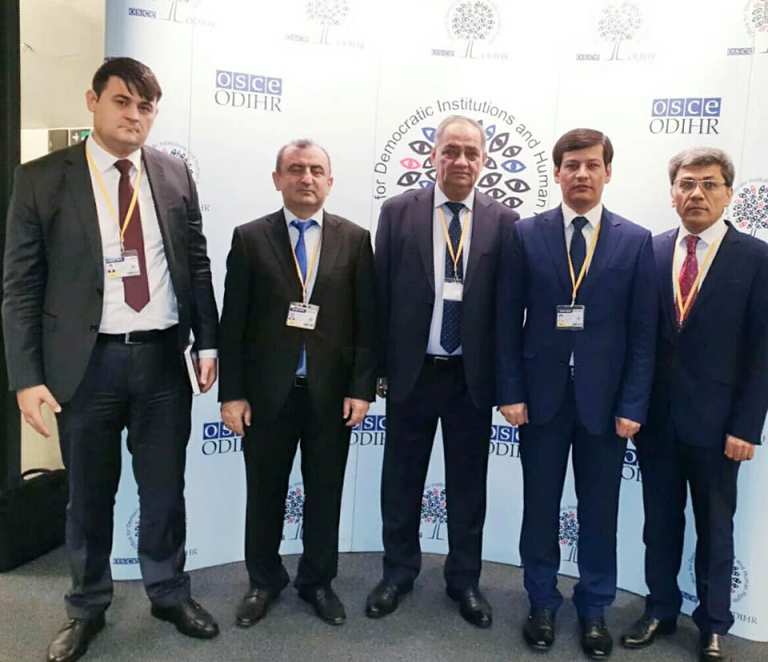
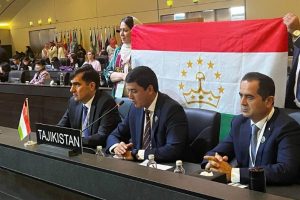 Tugay Forests of the Tigrovaya Balka Nature Reserve Included in the UNESCO World Heritage List
Tugay Forests of the Tigrovaya Balka Nature Reserve Included in the UNESCO World Heritage List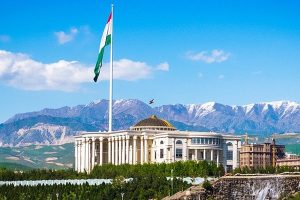 TAJIKISTAN IS TAKING SUSTAINABLE STEPS TO PROVIDE THE RIGHTS AND FREEDOMS OF HUMAN AND CITIZEN. In the light of the adoption of the National Strategy of Tajikistan in the field of human rights protection for the period up to 2038
TAJIKISTAN IS TAKING SUSTAINABLE STEPS TO PROVIDE THE RIGHTS AND FREEDOMS OF HUMAN AND CITIZEN. In the light of the adoption of the National Strategy of Tajikistan in the field of human rights protection for the period up to 2038 Buta Airways Carries First Baku — Dushanbe Flight
Buta Airways Carries First Baku — Dushanbe Flight President of Tajikistan Sends Humanitarian Aid to Earthquake Affected People in Syria
President of Tajikistan Sends Humanitarian Aid to Earthquake Affected People in Syria President Sends Aid to Families Affected by the Natural Disaster in the Gorno-Badakhshan Autonomous Region
President Sends Aid to Families Affected by the Natural Disaster in the Gorno-Badakhshan Autonomous Region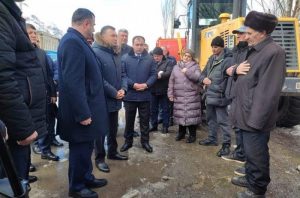 Prime Minister Rasulzoda Visits Khorug
Prime Minister Rasulzoda Visits Khorug IRS: The Consequences of Avalanches Have Been Eliminated on the Dushanbe-Chanak Highway and Traffic Has Been Provided
IRS: The Consequences of Avalanches Have Been Eliminated on the Dushanbe-Chanak Highway and Traffic Has Been Provided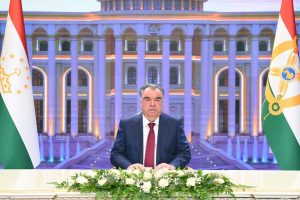 President Emomali Rahmon Calls 2022 Another Historic Year for Tajikistan
President Emomali Rahmon Calls 2022 Another Historic Year for Tajikistan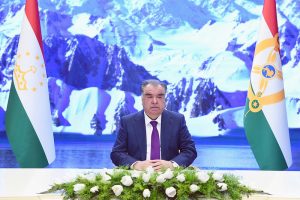 UNGA Supports President Rahmon’s Initiative to Declare 2025 as the International Year of Glacier Protection
UNGA Supports President Rahmon’s Initiative to Declare 2025 as the International Year of Glacier Protection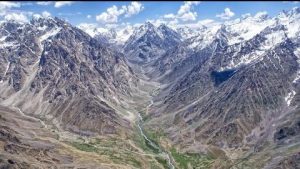 GEOLOGIST’S DAY. How Rich Is Tajikistan and Why Is It Important to Develop Geology in the Modern World?
GEOLOGIST’S DAY. How Rich Is Tajikistan and Why Is It Important to Develop Geology in the Modern World? Kazakhstan Plans to Open a New Flight to Dushanbe in 2023
Kazakhstan Plans to Open a New Flight to Dushanbe in 2023 Jazeera Airways Will Connect Kuwait with Tajikistan
Jazeera Airways Will Connect Kuwait with Tajikistan













